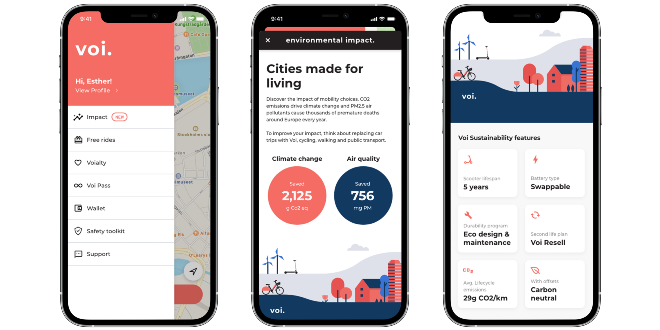
Photo: Voi
Voi launches new app feature to map sustainable travel
01 November 2021
by Christopher Carey
Swedish micromobility firm Voi is launching an environmental impact dashboard through its app to inform riders about CO2 emissions and the air quality impact of their journeys.
The Impact Dashboard will display the estimated CO2 emissions its customers have avoided by opting for e-scooters or e-bikes for their trips.
Fredrik Hjelm, CEO and co-founder of Voi, said: “While heads of state, delegates and civil society gather in Glasgow for COP26, we want to do our part by giving people the tools to make informed mobility choices so they can have an active role in the transition to sustainable transport.
“Together, with cities, citizens and other public transport and micromobility operators, [we are] reducing the need for short car trips [to] reduce harmful emissions and re-shape our cities so they are made for living.”
Life Cycle Assessment
Data will take into account the emissions produced across the full lifecycle of vehicles from production to end-of-life recycling.
According to Voi’s Life Cycle Assessment (LCA), conducted by EY, the average Voi scooter ride emits 29g CO2 equivalent per passenger kilometre of lifecycle emissions compared with 184g per passenger kilometre emitted by a passenger car.
Voi claims its current lifecycle emissions have been reduced drastically over the past three years, primarily due to extending vehicle lifespan from several months to five years and scaling its net-zero operations.
MaaSLab
The firm says the environmental calculator on which the dashboard is built was verified by transport modellers at University College London’s MaaSLab.
It uses a combination of data including: each user’s ride data; car replacement rates collected from Voi rider research; official emission factors for other transport modes; Voi’s CO2 and PM2.5 equivalents emission factors based on an LCA which analysed the full lifespan environmental impact of Voi’s service; and the firm’s portfolio of verified carbon offsetting projects.
Over time, the impact dashboard will develop to showcase the user’s own impact on the environment by opting for sustainable micromobility.
Voi says this will not only allow people to further explore the carbon reduction potential of their mobility choices, but also provide them with additional information on how mobility habits impact public health.
Image: Voi













